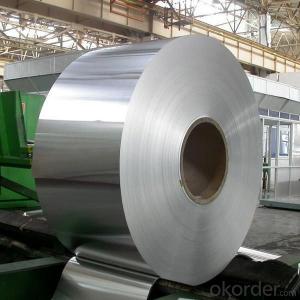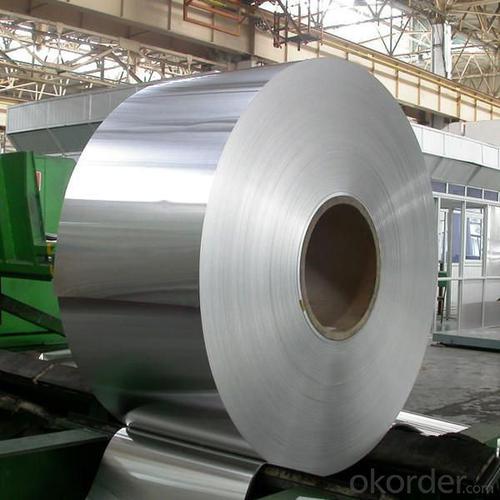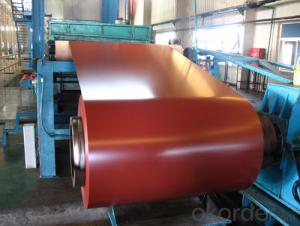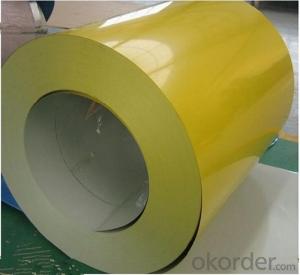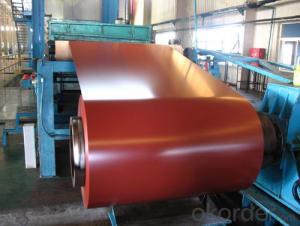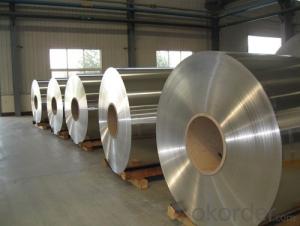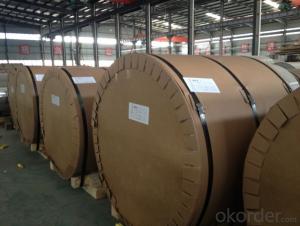Aluminum Steel Coils for Decoration Materials Production
- Loading Port:
- Shanghai
- Payment Terms:
- TT OR LC
- Min Order Qty:
- 5 m.t.
- Supply Capability:
- 60000 m.t./month
OKorder Service Pledge
OKorder Financial Service
You Might Also Like
Specification
Aluminium Coil For Decoration Materials Production
Alloy | 1050, 1060,1100, 3003 3004 3105 3A21 5005 5052 etc |
Temper | O/H12/H14/H1/H18/H32/H34/H36/H38//H111/H112/H116/H321/T6/T651/T3/T351 etc |
Thickness | 0.1mm to 6mm |
Width | 20mm to 3300mm |
Coil weight | 100kgs to 6 tons depends on actual requirement |
Core material | Aluminum or paper |
Coil inner diameter | 75mm, 150mm, 200mm, 300mm, 405mm, 505mm or as required |
Appplication | construction, roofing, decoration, lamping etc |
Package | eye to wall or eye to the wall for aluminum coil with wood pallet (wooded case also available) |
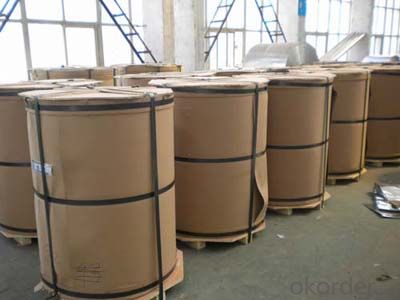
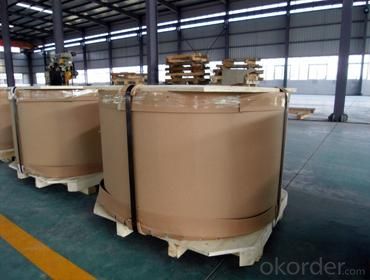
3) Glass curtain wall frame
4) Interior decoration
5) Elevator decoration
6) Signs, nameplate, bags making.
7) Automobile parts material
8) Office and Household appliances: HVAC equipments
9) The consumer electronics: mobile phones, digital cameras, MP3 .etc.
Coating varieties
Polyester Coatings (PE)
PE (polyester) coatings exhibit an excellent combination of hardness, flexibility, flow, appearance, and superior resistance to dirt retention in indoor and outdoor applications. These coatings are highly resistant to abrasion, metal marking, staining, and marring, and require minimal maintenance. Glazetech uses polyester paints which provide excellent colour and gloss retention properties.
Polyvinylidene Fluoride Coatings (PVDF)
PVDF (polyvinylidene fluoride) is a chemical resistant thick film barrier coating commonly used in architectural applications where both excellent appearance and substrate protection must be maintained over a long period of time. This coating is unaffected by most chemicals and solvents and has excellent wear and abrasion resistance. PVDF also has a high dielectric strength, excellent resistance to weathering and the ability to self extinguish.
FAQ
--Q: Do you provide free samples?
--A: Yes, free samples will be sent to you on freight at destination.
--Q: Can I get your latest products catalogue?
--A: Yes, it will be sent to you in no time.
--Q: What is the MOQ?
--A: 2 tons
--Q: What are your payment terms?
--A: We accept L/C, T/T.
--Q: What kinds of alloy can you supply?
--A: 1000 series: 1050, 1060, 1070, 1100, 1145, 1200
3000 series: 3003, 3004, 3105, 3104
5000 series: 5052, 5083, 5754, 5182
6000 series: 6061, 6063, 6062, 6063
8000 series: 8011, 8021
--Q: What’s the coating of top side?
--A: PVDF and PE coating
--Q: What kinds of temper can you supply?
--A: O-H112: O,H12,H14,H16,H18,H22,H24,H26,H,32,H34,H111,H112
T3, T4, T6
- Q: Why is the aluminum roll upset?
- Mainly in the aluminum slitting process, for various reasons, does not meet the standards and specifications of products, can be used to roll the machine from the new trimming and slitting, winding up to meet customer needs of product specifications
- Q: Is it possible to recycle aluminum coils?
- <p>Yes, aluminum coil can be recycled. Recycling aluminum is a highly efficient and environmentally friendly process. It requires only 5% of the energy needed to produce new aluminum from raw materials. Recycled aluminum coils can be used to manufacture new aluminum products, reducing waste and conserving resources. The recycling process typically involves melting the aluminum, which can then be reshaped into new coils or other forms. This makes aluminum one of the most recycled materials in the world.</p>
- Q: How do you store aluminum coils to prevent damage?
- To prevent damage and store aluminum coils effectively, there are several important steps that can be taken. First and foremost, it is crucial to maintain a clean, dry storage area that is completely free from moisture and humidity. Moisture can gradually corrode the aluminum coils and cause significant damage over time. Secondly, it is advisable to store the coils in an upright position, preferably on pallets or racks, in order to avoid any bending or warping. By keeping them upright, the risk of coil deformation is minimized, ensuring that their shape remains intact for future use. Furthermore, it is recommended to shield the coils from dust, dirt, and other contaminants by covering them with a protective material such as plastic or tarp. This protective layer not only safeguards the coils from external particles but also isolates them from any potential chemical exposure that could accelerate corrosion. Additionally, it is of utmost importance to handle the coils with care during the storage process to prevent dents or scratches. Rough handling or accidental dropping can result in physical damage. Therefore, appropriate lifting equipment like forklifts or cranes should be used when moving or stacking the coils. Lastly, regular inspections should be carried out to check for any signs of damage or corrosion during storage. By conducting visual checks on a periodic basis, any issues can be identified early on, allowing for necessary interventions to prevent further damage. By adhering to these storage practices, damage to aluminum coils can be effectively prevented, ensuring their longevity and preserving their quality for future utilization.
- Q: This question asks for a comparison of the pros and cons associated with the use of aluminum coils.
- <p>Aluminum coils offer several advantages, including high thermal conductivity, which makes them efficient for heat transfer applications. They are lightweight and corrosion-resistant, which enhances their durability and reduces maintenance needs. Additionally, aluminum is a cost-effective material compared to other metals like copper. However, there are disadvantages such as lower strength compared to steel, which may limit its use in high-stress applications. Aluminum also has a higher coefficient of expansion, which can lead to issues in precision applications. Lastly, while it is recyclable, the recycling process can be energy-intensive.</p>
- Q: What are the advantages of using aluminum coils over other materials?
- There are several advantages of using aluminum coils over other materials. Firstly, aluminum is a lightweight material, making it easier to handle and transport. This lightweight nature also makes it more cost-effective as it requires less energy to manufacture and install. Secondly, aluminum has a high level of corrosion resistance. It does not rust, even when exposed to harsh environmental conditions, making it suitable for outdoor applications. This durability ensures a longer lifespan and reduces maintenance costs in the long run. Additionally, aluminum coils provide excellent heat transfer properties. They have a high thermal conductivity, allowing for efficient heat exchange. This makes them ideal for applications such as heating, ventilation, and air conditioning systems, where effective heat transfer is crucial. Moreover, aluminum is a highly recyclable material. It can be recycled repeatedly without losing its quality or performance. This not only reduces waste and contributes to environmental sustainability but also lowers production costs. Lastly, aluminum coils offer versatility in terms of design and customization. They can be easily formed, shaped, and coated to meet specific requirements. This flexibility allows for a wide range of applications in various industries, from automotive and construction to electronics and aerospace. Overall, the advantages of using aluminum coils, including its lightweight nature, corrosion resistance, heat transfer properties, recyclability, and versatility, make it a preferred choice over other materials.
- Q: How heavy and long is the aluminum rolling on average?
- The aluminum density is 2.7, and the average weight of molded aluminum coil is within 3.5 tons. But that depends on the molded width and thickness. The wider and thicker it is , the shorter it is.
- Q: Are there any environmental benefits to using aluminum coils?
- Using aluminum coils offers several environmental benefits. First and foremost, aluminum is a highly sustainable material that can be recycled without losing its original properties. This reduces the need for mining and extracting new raw materials, thereby decreasing the environmental impact of these processes. Additionally, recycling aluminum requires only a fraction of the energy needed to produce primary aluminum, resulting in substantial energy savings and reduced greenhouse gas emissions. In addition, aluminum coils have a longer lifespan compared to other commonly used materials like copper or steel. This means that fewer coils need to be manufactured and replaced over time, leading to reduced waste generation and a lower overall environmental impact. Furthermore, aluminum is corrosion-resistant, eliminating the need for potentially harmful treatments or coatings. This reduces the release of hazardous substances into the environment during the manufacturing and use of aluminum coils. Lastly, aluminum's lightweight nature contributes to lower transportation costs and energy consumption during distribution. This results in decreased fuel consumption and associated emissions, ultimately reducing the carbon footprint of using aluminum coils. Taking all these factors into consideration, the use of aluminum coils provides significant environmental benefits, including reduced resource extraction, energy conservation, waste reduction, and lower emissions.
- Q: Is it possible to use an aluminum coil for cooking rice?
- <p>While it is technically possible to use an aluminum coil to cook rice, it is not recommended due to potential health risks. Aluminum can leach into food, especially when heated, and long-term exposure to aluminum may have adverse effects on health. Instead, use materials like stainless steel, cast iron, or non-stick cookware specifically designed for cooking rice to ensure safety and better results.</p>
- Q: What are the maintenance requirements for aluminum coils?
- The maintenance requirements for aluminum coils typically involve regular cleaning to remove dirt and debris, inspection for any signs of corrosion or damage, and ensuring proper airflow around the coils to prevent overheating. Additionally, periodic lubrication of moving parts and regular filter replacement are recommended to maintain optimal performance and efficiency.
- Q: What are the different coil packaging options for aluminum coils?
- There are several different coil packaging options available for aluminum coils, depending on the specific requirements and preferences of the customer. One common packaging option is the wooden crate. Aluminum coils can be securely stored and transported in wooden crates, which provide excellent protection against damage during handling and shipping. These crates are typically made of sturdy wood and are designed to safely hold the coils in place, preventing any movement or shifting that could lead to dents or scratches. Additionally, wooden crates are often equipped with metal bands or straps to further secure the coils and ensure their integrity. Another popular packaging option is the steel cage. Steel cages are durable and offer exceptional protection for aluminum coils. These cages are typically made of heavy-duty steel and are designed to withstand the rigors of transportation and storage. Like wooden crates, steel cages are equipped with straps or bands to secure the coils in place and prevent any movement or damage. In addition to wooden crates and steel cages, aluminum coils can also be packaged using stretch wrap or shrink wrap. Stretch wrap consists of a plastic film that is tightly wrapped around the coils, creating a secure and protective layer. Shrink wrap, on the other hand, is a plastic film that is heated and shrinks tightly around the coils, providing a tight and secure packaging solution. Both stretch wrap and shrink wrap offer good protection against dust, moisture, and other environmental factors. Lastly, some companies may opt for special coil packaging options, such as custom-made crates or containers, to meet their specific needs. These customized packaging solutions can be tailored to accommodate the size, weight, and other unique requirements of the aluminum coils, ensuring maximum protection during transportation and storage. Overall, the different coil packaging options for aluminum coils include wooden crates, steel cages, stretch wrap, shrink wrap, and customized packaging solutions. Each option offers varying levels of protection, allowing customers to choose the packaging method that best suits their specific needs and budget.
Send your message to us
Aluminum Steel Coils for Decoration Materials Production
- Loading Port:
- Shanghai
- Payment Terms:
- TT OR LC
- Min Order Qty:
- 5 m.t.
- Supply Capability:
- 60000 m.t./month
OKorder Service Pledge
OKorder Financial Service
Similar products
Hot products
Hot Searches
Related keywords
